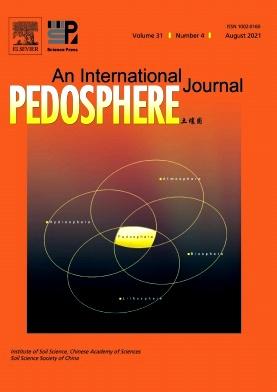氧化物纳米粒子对土壤保水曲线和土壤抗拉强度的影响
IF 5.2
2区 农林科学
Q1 SOIL SCIENCE
引用次数: 0
摘要
本文章由计算机程序翻译,如有差异,请以英文原文为准。
Effects of metal oxide nanoparticles on soil water retention curve and tensile strength
Generally, nanotechnology plays an very important role in various applied scientific fields. Iron and magnesium nanoparticles (NPs) can cause positive or negative changes in soil physical and mechanical properties, especially in long periods. The aim of this study was to investigate the multi-year effects of NPs on soil water retention and aggregate tensile strength. A wheat farm loamy soil was amended with 1%, 3%, and 5% (weight/weight) of magnesium oxide (MgO) and iron oxide (Fe3O4) NPs in three replications and incubated for three years. Water contents were measured at different matric suctions of 0, 10, 20, 40, 60, 100, 300, 1 000, and 15 000 cm. The van Genuchten model was fitted to the moisture data. Tensile strength was measured on the 2–4 mm aggregates at matric suctions of 300 (i.e., field capacity) and 15 000 (i.e., permanent wilting point) cm. The results showed that the levels of 1% and 3% Fe3O4 NPs significantly increased water retention, compared to the no NP application control and 5% MgO NPs, which is probably due to the increase of adsorption surfaces in the treated soils. Water contents at field capacity and permanent wilting point in the 5% MgO NP treatment decreased compared to those of the other treatments, due to the increased soil vulnerability and reduced soil fine pores. The application of Fe3O4 NPs did not have any significant effect on soil tensile strength. Based on the results of this study, soil physical and mechanical properties could be affected by NP application.
求助全文
通过发布文献求助,成功后即可免费获取论文全文。
去求助
来源期刊

Pedosphere
环境科学-土壤科学
CiteScore
11.70
自引率
1.80%
发文量
147
审稿时长
5.0 months
期刊介绍:
PEDOSPHERE—a peer-reviewed international journal published bimonthly in English—welcomes submissions from scientists around the world under a broad scope of topics relevant to timely, high quality original research findings, especially up-to-date achievements and advances in the entire field of soil science studies dealing with environmental science, ecology, agriculture, bioscience, geoscience, forestry, etc. It publishes mainly original research articles as well as some reviews, mini reviews, short communications and special issues.
 求助内容:
求助内容: 应助结果提醒方式:
应助结果提醒方式:


